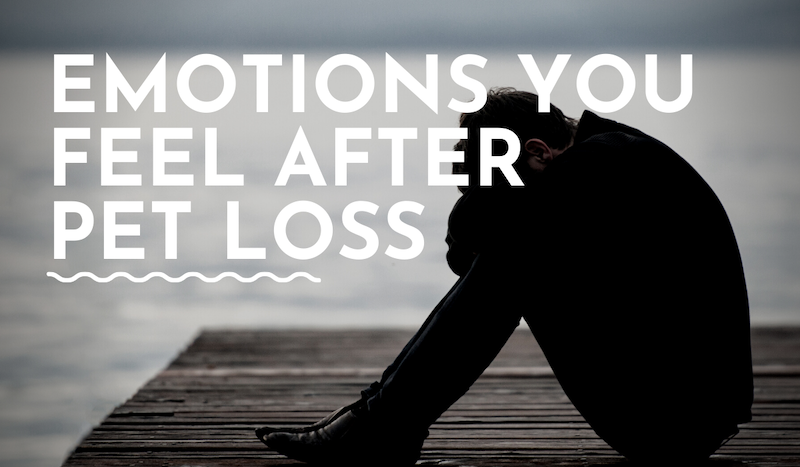Losing a pet can be a heartbreaking experience, after which you may find yourself experiencing a range of emotions, starting with a deep sense of sadness and grief, anger, and even guilt.
However, while some of these can be confusing and overwhelming, to the point where you may feel like you’re in a fog, it’s important to remember that they are a completely normal process of grieving.
Therefore, in this article, we will discuss the range of emotions most pet owners feel after losing a beloved companion, how to manage them, and when to seek help.

The Five Stages of Grief
It’s well known that grief is a deeply personal and complex process, affecting each individual differently.
However, we also know that grief usually consists of five stages, which may be experienced in different orders and severities.
Therefore, it’s important to understand the stages of grief as you begin to experience them, as this can provide comfort and guidance, helping pet owners navigate their emotions and find a path toward healing.
Denial
Denial is the initial stage of grief, during which the reality of losing a pet feels impossible to accept.
Pet owners might find themselves thinking, “This can’t be happening,” or expecting to see their pet around the house.
This stage acts as a buffer, allowing the mind to absorb the shock more slowly.
For example, some pet owners might keep their pet’s belongings intact, hoping their furry friend will return, while others may find themselves calling for their departed friend or expecting them to greet them as they enter the home.
This is a natural response to loss, and it can take time to come to terms with the reality of the situation.
Anger
Anger is a stage that often follows the initial shock and denial and can be directed towards oneself, others, or even the pet for leaving.
Pet owners might feel frustration or resentment, questioning why their beloved companion had to go so soon.
It’s common to hear things like, “Why did this happen to my pet?”
During this stage, try to remember that anger is a natural part of the healing process, serving as an emotional release of the pain and sadness.
However, while giving yourself grace during this time is important, be cautious of taking your anger out on the people in your circle, as this behavior can strain relationships and create misunderstandings, making the grieving process even more challenging for everyone involved.
Bargaining
In the bargaining stage, pet owners might make deals or promises in an attempt to reverse the loss or make the pain more bearable.
They might think, “If only I had taken them to the vet sooner,” or “I would give anything to have them back.”
This stage reflects the struggle to regain control and find meaning in the loss.
For instance, a person might vow to adopt another pet in hopes of lessening their grief or swear they will do everything they possibly can, including buying their other pets the highest-quality food, taking them to extra-regular check-ups, and prioritizing spending time with them as a way to make up for the loss of their departed pet.
Depression
Depression, often referred to as the longest stage of grief, sets in as the weight of the loss becomes undeniable, leading to feelings of deep sadness and emptiness.
Pet owners may withdraw from their usual activities, lose interest in things they once enjoyed, or feel a profound sense of loneliness.
They might think, “Life will never be the same without my pet.”
This stage is critical for processing the loss and beginning the journey toward healing.
However, as this stage can drag its heels for a long time, it can have a devastating effect on the person’s quality of life.
This is why, while it’s important to give yourself time to grieve your beloved friend, you should also consider seeking help from others if depression starts to get in the way of completing basic daily tasks like brushing your teeth and bathing and disrupts activities you previously enjoyed, such as engaging in hobbies and socializing.
Acceptance
Acceptance is often the final stage, where the reality of the loss is fully acknowledged, and pet owners begin to find ways to move forward.
This doesn’t mean the pain is gone but becomes more manageable.
Acceptance can manifest as finding comfort in memories and cherishing the time spent with their pet.
For example, someone might create a memorial or scrapbook to honor their beloved companion and will actually feel good about it, which signifies a step toward emotional healing.
Other Symptoms of Grief After Pet Loss
Apart from the five stages of grief, many pet owners will experience the following emotions:
Loneliness
Loneliness can be a profound symptom of grief after losing a pet.
Pet owners often feel isolated without their pet’s companionship, missing the daily routines and the unconditional love their furry friend provided.
This loneliness can manifest as a reluctance to return home to an empty house or feeling a void during activities that were once shared with their pet.
The absence of a pet’s presence can make even ordinary moments feel deeply solitary.
Guilt
Guilt is another common emotion felt by grieving pet owners. They may question their actions, wondering if there was something more they could have done to prevent their pet’s death.
Thoughts like, “If only I had noticed the symptoms earlier” or “I should have spent more time with them” are frequent.
This guilt can be overwhelming as pet owners replay scenarios in their minds, struggling with the idea that they let their beloved companion down.
Anxiety
Anxiety can also accompany the grief of losing a pet, as the uncertainty and fear of facing life without their cherished companion can cause heightened stress and worry for pet owners.
This may often happen for pet owners who have relied on guard dogs to go outside at night or those who are dealing with mental health issues with which their pet helped them cope.
Anxiety might present itself through physical symptoms like restlessness, difficulty sleeping, or an inability to concentrate on daily tasks.
Acceptance and Moving Forward

Losing a pet is never easy, but with time and effort, you can learn to accept the loss and move forward.
Here are some ways to find closure and honor your beloved pet.
Finding Closure
Accepting the loss of your pet can be a difficult process, but it’s an important step in moving forward. Here are some tips to help you find closure:
Allow yourself to grieve: It’s okay to feel sad, angry, or even guilty after losing a pet. Give yourself time to process your emotions, and don’t be afraid to seek support from friends or family.
Create a memorial: Consider creating a memorial for your pet, such as a photo album, scrapbook, or even a special piece of jewelry. This can help provide a sense of closure.
Honor your pet’s life: Consider honoring your pet’s life by making the world a better place. This may be through actions like planting a tree in their honor, donating to a cause that would’ve meant to your pet (such as a research facility for animal diseases or a vet clinic), or volunteering at a local shelter to help other animals in need.
Seek professional help: If the loss of your pet is causing you to skip completing basic daily tasks and is making you anxious, depressed, or struggling to cope with regular activities, consider talking to a therapist or counselor. They can provide support and guidance as you navigate this difficult time.
Remember, everyone grieves differently, and there’s no “right” way to cope with the loss of a pet. Take the time you need to heal and honor your pet’s memory in a way that feels meaningful to you.